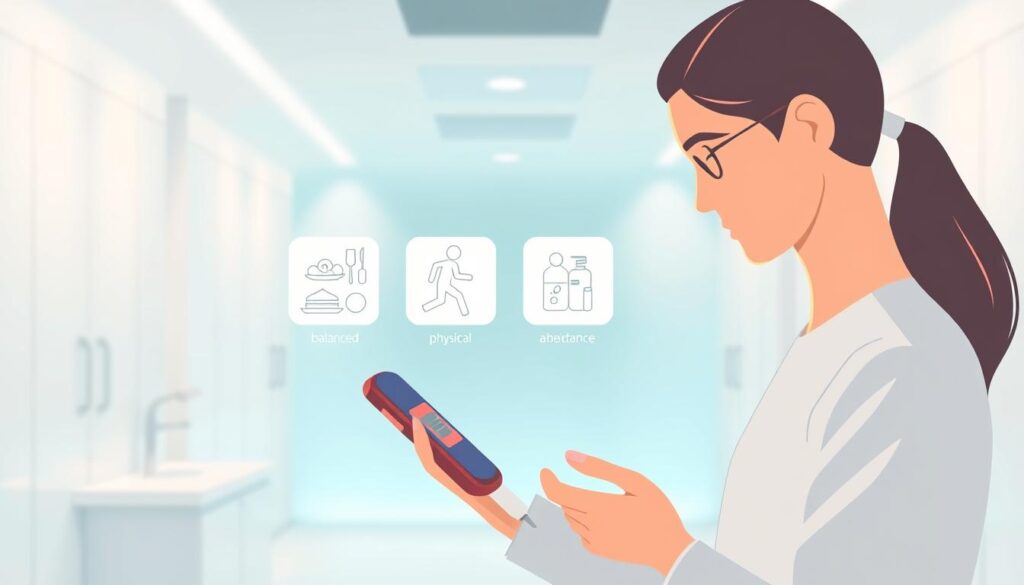Diabetes management is a journey, not a finish line. With over 133 million Americans dealing with diabetes or prediabetes, it’s key to take charge of your health. Diabetes is a long-term condition that raises blood sugar levels. It affects everyone, no matter their age, gender, or where they live.
In 2019, 37.3 million people, or 11.3% of the U.S., had diabetes. Learning about diabetes can change your life. It’s important for you and for society. By understanding diabetes, you can manage it better and feel better overall.
Key Takeaways
- Diabetes is a chronic medical condition that affects millions of Americans.
- Effective diabetes management is crucial for maintaining good health.
- Understanding diabetes is the first step towards taking control of your condition.
- Diabetes knows no boundaries – age, gender, or geographic location.
- Education and awareness are key to managing diabetes and improving overall well-being.
- With the right knowledge and support, you can navigate the complex world of diabetes and take control of your health.
This guide will help you understand diabetes and start managing it. Remember, keeping your blood sugar levels in check is key. With the right approach, you can live a healthy and fulfilling life with diabetes.
Table of Contents
What is Diabetes: Understanding the Basics
Diabetes is a long-term health issue where blood sugar levels are too high. It’s important to know the symptoms and treatment options. This helps manage the disease. The body can’t make enough insulin, a key hormone for blood sugar control.
There are several types of diabetes, like Type 1, Type 2, and gestational diabetes. Type 2 diabetes is the most common, making up 90% to 95% of cases. Knowing the symptoms, like feeling very thirsty and hungry, is key for early treatment.
Diabetes can cause serious problems if not treated, like kidney failure, blindness, and amputations. It’s vital to know the symptoms and get medical help if you notice them. Eating well and exercising regularly can help prevent or manage diabetes.
The table below shows the different types of diabetes and what they are:
| Type of Diabetes | Description |
|---|---|
| Type 1 Diabetes | An autoimmune disease that causes the body to produce little to no insulin |
| Type 2 Diabetes | A metabolic disorder that causes the body to become resistant to insulin |
| Gestational Diabetes | A type of diabetes that develops during pregnancy |
Knowing the symptoms and treatment options is key to managing diabetes and avoiding complications. By recognizing the signs and getting medical help, you can control your health and avoid long-term damage.
Recognizing the Warning Signs of Diabetes
Learning about diabetes is key to taking care of your health. High blood sugar levels can cause serious problems like ketoacidosis. So, catching it early and treating it fast is very important.
Signs of diabetes include being very thirsty, needing to pee a lot, losing weight without trying, feeling tired, and being easily upset.
Knowing how insulin works in your body is also crucial. If your body can’t make enough insulin or use it right, blood sugar levels go up. This can lead to diabetes. Spotting signs like needing to pee a lot and being thirsty can help you get help fast.
Some important signs of diabetes are:
- Feeling very hungry and tired
- Needing to pee a lot and being thirsty
- Unexplained weight loss and feeling irritable
Knowing these symptoms and acting on them is vital. Spotting diabetes signs early can help you manage it and avoid serious problems.

Understanding how blood sugar and insulin work together helps you manage diabetes better. Early diagnosis and treatment are essential for a healthy life with diabetes.
| Symptom | Description |
|---|---|
| Increased urination | Frequent need to urinate, even at night |
| Increased thirst | Feeling thirsty, even after drinking water |
Risk Factors That May Affect Your Diabetes Status
Understanding diabetes risk factors is key to preventing and managing it. White people are more likely to get type 1 diabetes than African Americans and Hispanics. Type 2 diabetes often hits those who are overweight or obese, with about 70% of cases.
Age is a big risk factor, with people over 45 at high risk for type 2 diabetes. Over 80% of new cases happen in this age group. Having a family history of type 2 diabetes also raises your risk, making you 2 to 6 times more likely to get it. Being inactive also increases your risk, with a 50% higher chance of getting type 2 diabetes.
Other factors like non-alcoholic fatty liver disease (NAFLD) also raise your risk. Almost 75% of people with type 2 diabetes also have NAFLD. Regular exercise and a healthy weight can lower your risk. Losing 5% to 10% of your body weight can make a big difference. Knowing these risk factors is crucial for managing both type 1 and type 2 diabetes.

| Risk Factor | Description |
|---|---|
| Genetic and Family History Factors | Having a family history of type 2 diabetes increases the risk |
| Lifestyle-Related Risk Factors | Physical inactivity, overweight or obesity, and certain medical conditions |
| Medical Conditions That Increase Your Risk | Non-alcoholic fatty liver disease (NAFLD), gestational diabetes, and polycystic ovary syndrome (PCOS) |
Managing Your Blood Sugar Levels
Understanding your diabetes diagnosis is key when managing gestational diabetes and other diabetes types. Blood sugar targets are usually between 80 to 130 mg/dL before eating and under 180 mg/dL two hours after. It’s important to work with your doctor to find the right blood sugar range for you.
Watching what you eat and staying active are crucial. Carbs greatly affect blood sugar, so controlling them is vital. Aim for 150 minutes of moderate exercise weekly to help manage diabetes. Also, doing strength exercises 2 to 3 times a week is good.
Here are some tips for managing blood sugar levels:
- Check your blood sugar often, before, during, and after working out
- Drink plenty of water to avoid dehydration, which can raise blood sugar
- Eat a balanced diet with fruits, veggies, whole grains, and lean proteins
By following these tips and working with your doctor, you can manage your blood sugar well. This helps lower the risk of gestational diabetes and other diabetes complications. Remember, keeping your blood sugar in check is a continuous effort that needs regular checks and adjustments.
| Blood Sugar Level | Action |
|---|---|
| Below 70 mg/dL | Consider hypoglycemia treatment |
| Between 80 to 130 mg/dL | Monitor and adjust diet and exercise as needed |
| Above 240 mg/dL | Seek medical attention and consider ketone testing |
Living Well with Diabetes: Lifestyle Changes That Matter
Managing diabetes means making lifestyle changes. These changes help prevent and manage diabetes. Regular exercise, like aerobic and strength training, helps control blood sugar. Eating a healthy diet, focusing on whole foods, is also key.
Here are some tips for a diabetes-friendly diet:
- Eat regular meals to keep blood sugar stable
- Choose whole, unprocessed foods like veggies, whole grains, and lean proteins
- Drink less sugary drinks and avoid refined carbs
Stress management is also vital for managing diabetes. Activities like meditation, yoga, and deep breathing help. By adopting these changes, people with diabetes can manage their condition better and lower their risk of complications.
| Lifestyle Change | Benefits for Diabetes Management |
|---|---|
| Regular Physical Activity | Improves insulin sensitivity, controls blood sugar levels |
| Healthy Diet | Helps maintain stable blood sugar levels, promotes weight loss |
| Stress Management | Reduces stress, promotes overall well-being |
Conclusion: Taking Control of Your Diabetes Journey
Starting your diabetes journey means you have the power to control your health. Keeping your blood sugar, blood pressure, and cholesterol in check is key. This can greatly improve your health and lower the risk of serious problems.
Regular exercise, a healthy diet, and enough sleep are vital for managing diabetes. With hard work and a proactive mindset, you can reach your blood sugar goals. This will lead to a better life.
Managing diabetes can be tough, but new tech and treatments offer hope. Tools like continuous glucose monitors and wearables give you insights. They help you make smart health choices.
You’re not alone in this fight. Get help from your healthcare team, family, and friends. Working together, you can face challenges and live well with diabetes.Living with diabetes can feel overwhelming at times, especially when navigating the complexities of managing your condition. What is diabetes? It’s a chronic disease that affects how your body processes blood sugar (glucose). Understanding the intricacies of diabetes management is essential. By taking control of your diabetes journey, you empower yourself to make informed decisions about your health. With the right knowledge, strategies, and support, you can lead a fulfilling life despite the challenges posed by this condition.
Creating a sustainable plan that includes balanced nutrition, regular exercise, and consistent monitoring of blood sugar levels is vital for effective management. Start by researching what works best for you and seeking guidance from trusted sources. A well-structured approach to your diabetes care not only helps manage symptoms but also contributes to your overall well-being. Remember that this journey is unique to every individual; you must find what fits your lifestyle and preferences.
You’re not alone in this fight. Support from your healthcare team, family, and friends can make a significant difference in your journey. Sharing your experiences can alleviate feelings of isolation and encourage others to join in on your quest for better health. Working together can make overcoming challenges seem less daunting and more manageable. Take advantage of the resources available to you, including support groups and educational programs that can provide additional insights into living well with diabetes.
Ultimately, taking control of your diabetes journey requires commitment, patience, and resilience. By equipping yourself with knowledge and surrounding yourself with a supportive network, you can navigate the complexities of diabetes with confidence. Celebrate small victories along the way and remember that every step—no matter how small—brings you closer to a healthier, happier life. Embrace this journey and make it your own; the power to thrive is within you.
FAQ
What is diabetes?
Diabetes is a long-term health issue. It affects how your body handles blood sugar (glucose). It happens when your body can’t make or use insulin well.
What are the different types of diabetes?
There are three main types of diabetes. Type 1 is when your body doesn’t make insulin. Type 2 is when your body can’t use insulin well. Gestational diabetes happens during pregnancy and goes away after.
How does blood sugar affect my overall health?
High blood sugar can harm your health. It can cause nerve damage, kidney disease, vision loss, and heart problems. Keeping blood sugar levels healthy is key to managing diabetes.
What are the common symptoms of diabetes?
Signs of diabetes include feeling very thirsty and urinating a lot. You might also feel tired, have blurry vision, and wounds heal slowly. If you notice these signs, see a doctor right away.
What are the risk factors for developing diabetes?
Risk factors include family history, age, being overweight, and not being active. High blood pressure and certain health conditions also increase your risk. Knowing these can help you take steps to prevent or manage diabetes.
How can I effectively manage my blood sugar levels?
Managing blood sugar involves medicine, diet, exercise, and lifestyle changes. This means checking your blood sugar often, eating right, staying active, and managing stress. Working with your healthcare team is also crucial.
What lifestyle changes can help me live well with diabetes?
Changes like eating healthy, being active, and managing stress can help a lot. These changes can prevent complications and keep your blood sugar in check. They improve your overall health and well-being.
How useful was this post?
Click on a star to rate it!
Share this article:
Meet Gluco 6
Blood sugar balance supplement
Tired of Type-2 controlling your life or worried that persistent high blood sugar may turn into something worse? Then yes, Gluco6 is right for you.
Gluco6 has already provided amazing blood sugar assistance for men and women in their 30s, 40, 50s and even 80s. Because it was formulated based on cutting-edge science and groundbreaking ingredients, Gluco6 is engineered to rapidly assist even the most erratic blood sugar levels.







